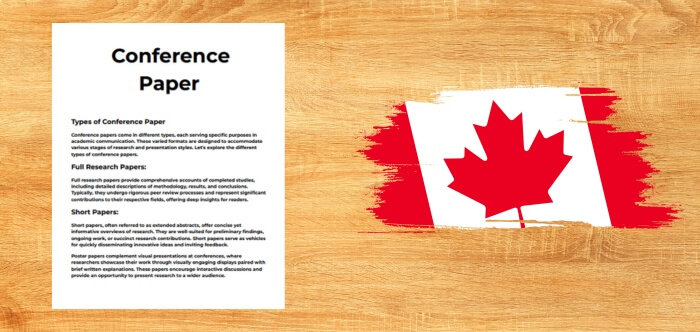The quest for knowledge in the realm of academia and research is an ever-evolving journey. Scholars, scientists, and experts alike continuously explore new frontiers of understanding, making strides toward innovation. Central to this pursuit is the question that often arises: “Is conference paper valuable?”
Yes, it is. Conference papers hold immense value as they facilitate the spreading of preliminary or ongoing research, provide a platform for acquiring constructive feedback, and enable engagement with a broader and diverse audience.
In the pages that follow, we will explore the intricate web of benefits that conference papers weave within the research community, shedding light on their undeniable value in the pursuit of knowledge and innovation.
Quick Overview of Conference Paper
Conference papers are concise research documents typically presented at academic conferences. They provide a platform for sharing preliminary findings, facilitating peer feedback, and engaging with a broader audience. These papers play a pivotal role in the academic landscape, bridging the gap between research and real-world impact.
Conference papers serve as vehicles for researchers to communicate their ongoing or initial studies, allowing them to disseminate their work beyond the confines of their institution. They enable constructive critique from experts in the field, fostering the refinement of research quality.
Moreover, they expand the reach of scholarly work, opening doors to collaboration and knowledge exchange with a diverse audience. While conference papers have intrinsic value in knowledge dissemination and academic interaction, they also contribute to the advancement of scholars’ careers, serving as essential components of their CVs.
Beyond academia, conference papers can influence industry practices, shape interdisciplinary collaborations, and impact funding opportunities. These papers are an integral part of the ever-evolving academic landscape, providing a platform for researchers to showcase their contributions to the world.
Types of Conference Paper
Conference papers come in different types, each serving specific purposes in academic communication. These varied formats are designed to accommodate various stages of research and presentation styles. Let’s explore the different types of conference papers.
Full Research Papers
Full research papers provide comprehensive accounts of completed studies, including detailed descriptions of methodology, results, and conclusions. Typically, they undergo rigorous peer review processes and represent significant contributions to their respective fields, offering deep insights for readers.
Short Papers
Short papers, often referred to as extended abstracts, offer concise yet informative overviews of research. They are well-suited for preliminary findings, ongoing work, or succinct research contributions. Short papers serve as vehicles for quickly disseminating innovative ideas and inviting feedback.
Poster Papers
Poster papers complement visual presentations at conferences, where researchers showcase their work through visually engaging displays paired with brief written explanations. These papers encourage interactive discussions and provide an opportunity to present research to a wider audience.
Panel Papers
Panel papers are integral to panel discussions or debates on specific topics. They provide essential background information, position statements, or critical context to guide the panel’s discourse. Panel papers contribute to informed and insightful discussions.
Workshop Papers
Workshop papers play a crucial role in hands-on sessions or specialized workshops. They focus on practical aspects, instructional content, or workshop outcomes, often emphasizing audience participation. These papers facilitate collaborative learning and skill development.
Demo Papers
Demo papers are designed to accompany live demonstrations of software, prototypes, or experimental systems. They elucidate the technical aspects and significance of the presented demos, enabling a deeper understanding of the showcased innovations.
Is Conference Paper Valuable?
In the busy world of academia, the question often arises: “is conference paper valuable?” These concise research documents play a pivotal role in circulating scholarly work, fostering collaboration, and advancing knowledge. They hold a unique position in the academic ecosystem, serving as catalysts for innovation and progress.
Conference papers offer a platform for researchers to share preliminary findings or ongoing research, facilitating ideas exchange within the academic community. They serve as a source of constructive feedback, helping authors refine their work and contributing to the quality of their respective fields. Professionals who seek to showcase their work on a global stage are often present at international events like conferences in Canada, as these events provide valuable opportunities to engage in diverse academic discussions and gain fresh insights.
Furthermore, conference papers extend the reach of research, enabling engagement with a diverse audience. They provide opportunities for scholars to present their work to peers, experts, and enthusiasts from around the world. This global interaction fosters a mix of ideas, leading to interdisciplinary collaborations and the emergence of fresh perspectives.
Centering our discussion on conference papers, we aim to explore their multifaceted importance within the academic landscape. These papers serve various vital roles, from sharing preliminary insights to shaping future research and influencing industry practices. As a result, they have established themselves as indispensable components of scholarly communication, continually proving their worth in academia.
Challenges and Criticisms of Conference Paper
While conference papers play a pivotal role in the academic world, they are not without their share of challenges and criticisms. These points underscore areas of concern within the academic community and provide insights into ongoing discussions and debates:
Limited Review Process
Some scholars contend that conference paper reviews by conference organizer may be less stringent than the peer review process associated with journals, potentially compromising the overall quality and credibility of the research presented.
Accessibility Concerns
There are instances where conference papers may not be readily accessible to the broader public due to subscription barriers or limited distribution channels, which can hinder the widespread dissemination of valuable knowledge.
Publication Pressure
Researchers may experience considerable pressure to publish their work in conferences, which can sometimes lead to a focus on quantity over the quality of research, potentially resulting in hurried or less rigorously conducted studies.
Field Variability
The perceived value of conference papers can vary significantly across academic disciplines, with some fields placing a stronger emphasis on journal publications as the gold standard, which can create disparities in the recognition and impact of conference papers.
Ethical Dilemmas
The academic community faces ethical dilemmas, such as cases of plagiarism or the procreation of predatory conferences that prioritize profit over academic rigor, casting shadows over the credibility of some conference papers.
Balancing Quantity and Quality
The drive to publish in conferences to bolster one’s academic record sometimes leads to a delicate balancing act between producing a high quantity of papers and ensuring the research is truly impactful, raising questions about the prioritization of research excellence.
These challenges and criticisms surrounding conference papers highlight the complexities and nuances of scholarly communication, and they serve as points of reflection for the academic community as it seeks to navigate these issues and enhance the value of conference papers.
Bottom line
In the journey of academic exploration, the question “is conference paper valuable?” has resoundingly found its answer. Conference papers, in their diverse forms and roles, prove their worth as essential vehicles for spreading knowledge, fostering collaboration, and shaping the future of research. They serve as bridges between scholars, enabling the exchange of preliminary insights, constructive feedback, and innovative ideas.
Moreover, conference papers extend the reach of research, and rise above geographical boundaries to engage a global audience. They empower researchers to make meaningful contributions to their fields and influence industry practices. However, while acknowledging their undeniable value, it’s essential to recognize the challenges and criticisms that accompany conference papers, such as concerns over accessibility and ethical dilemmas.
In the changing world of sharing knowledge, conference papers are still crucial. They show how academia adapts and stays strong, always valuable for learning and new ideas, connecting researchers worldwide.







